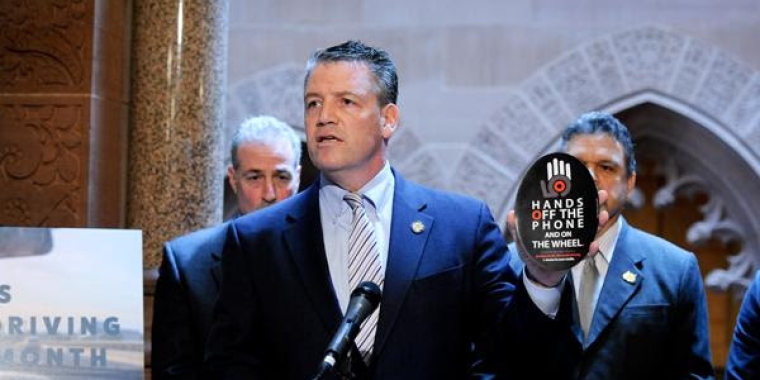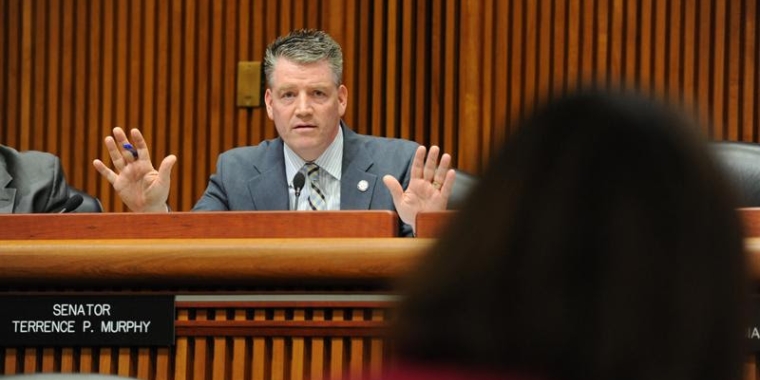
Senator Murphy, Assemblyman Ortiz, raise awareness of distracted driving in New York
April 5, 2016

ALBANY, NY - New York State Senator Terrence Murphy (R- Westchester) and Assembly Assistant Speaker Felix Ortiz (D-Kings), together with awareness organization Distracted Operators Risk Casualties (DORCs), today announced a joint effort that could go a long way in protecting innocent people from injuries caused by distracted driving.
"The facts regarding distracted driving are startling," Senator Murphy said. "Every year thousands of Americans are involved in a automobile accident a result of distractions behind the wheel. I am thrilled to partner with Assemblyman Ortiz and the Lieberman family to bring more awareness to this issue and support legislation that will help our law enforcement more effectively enforce the rules of the road."
DORCs co-founder Ben Lieberman, a staunch advocate against distracted driving since he and his family lost their 19-year-old son, Evan, in a 2011 collision caused by a distracted driver, has been working closely with Senator Murphy and Assemblyman Ortiz to implement the new law, known as "Evan's Law."
For weeks following the crash that resulted in Evan's death, the driver's phone was sitting in a junkyard, and police never retrieved the phone or phone records. Through his own civil lawsuit, Lieberman subpoenaed the phone records and discovered the driver had been texting while he was driving, leading up to the crash. Lieberman was surprised to learn that the local police force wasn't to blame, but rather that this was typical because there's a lack of an overall official, consistent police protocol to address this type of destructive behavior.
"The general public knows distracted driving is a problem, but if people knew the extent of the damage caused by this behavior, they would be amazed," Lieberman said. "With our current laws, we're not getting accurate information because the issue is not being addressed at the heart of the problem - with the people causing the collisions."
"I have often heard there is no such thing as a breathalyzer for distracted driving - so we created one," Lieberman continued. "Respecting drivers' personal privacy, however, is also important, and we are taking meticulous steps to not violate those rights."
A key part of the legislation involves new "Textalyzer" technology that will allow officers to detect whether or not the device was being used around the time of a crash, but will not provide access to any content- keeping conversations, contacts, numbers, photos, and application data private.
Cellebrite, the leader in mobile device forensics solutions, is developing this capability for officers to detect device usage in the field while maintaining the privacy of data stored on the device. "Cellebrite has been leading the adoption of field mobile forensics solutions by law enforcement for years, culminating in the formal introduction of our UFED FIELD series product line a year ago," said Jim Grady, CEO, Cellebrite, Inc. "We look forward to supporting DORCs and law enforcement-both in New York and nationally-to curb distracted driving."
This year, the number of car crashes rose by 14 percent marking the first increase after ten years of steady decline.
Assemblyman Ortiz said, "I'm proud to have been an early advocate to combat distracted driving, since the hands-free driving legislation I authored in 2001, but unfortunatley, the problem has developed beyond hands-free phone calling. There's a significant number of drivers who continually engage in reckless behavior, such as texting, using apps and browsing the web on their mobile devices while behind the wheel. These people will continue to put themselves and others at risk unless we come up with a protocol to successfully stop them."
According to the National Highway Traffic Safety Administration, driving a vehicle while texting is six times more dangerous than driving while intoxicated. Despite this fact, and despite knowledge of the risk to themselves and others, the AAA Foundation for Traffic Safety reports that 67 percent of drivers still use their mobile phones while behind the wheel.
"When people were held accountable for drunk driving, that's when positive change occurred. It's time to recognize that distracted driving is a similar impairment, and should be dealt with in a similar fashion. This is a way to address people who are causing damage." Lieberman said.



